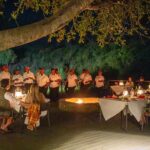Tuningi Joins Park Mahala Week
Inspiring the Next Generation of Conservationists
From 28 September to 5 October 2025, the North West Parks and Tourism Board (NWPTB) invited South Africans to celebrate Park Mahala Week – an inspiring initiative offering free entry to 13 of the province’s nature and game reserves. The goal? To reconnect local residents with the land, wildlife, and natural heritage that makes South Africa so unique.
While Madikwe Game Reserve remains a private, day-visitor-free reserve – ensuring a low-impact, conservation-focused safari experience for guests staying at its lodges – it participated in its own special way. This year, Madikwe’s lodges, including Tuningi Safari Lodge, came together to host a series of Mahala Drives for members of the local community.
Madikwe’s Way of Giving Back
On 30 September, Tuningi had the honour of welcoming local schoolchildren for a memorable two-hour drive through the reserve. Guided by our experienced rangers, the young guests experienced a real glimpse of the wilderness — from spotting elephants at the waterhole to learning about the delicate balance of life that sustains Madikwe’s diverse ecosystem.
These Mahala Drives are about more than just a safari. They’re an opportunity to share knowledge, spark curiosity, and inspire a sense of pride and stewardship in the next generation. Many of the children who live near the reserve have never been inside its borders, despite growing up alongside it. By inviting them in, even for a short time, we aim to help them understand what we’re working to protect — and why it matters.
A Shared Purpose
As Heritage Month draws to a close, initiatives like Park Mahala Week remind us that conservation is a shared responsibility. Each guest who stays at Tuningi contributes directly to the ongoing protection of Madikwe’s wildlife and landscapes — helping ensure that these same wild spaces can be enjoyed and celebrated by generations to come.
At Tuningi, we believe that true conservation starts with connection — connection to the land, to wildlife, and to people. The smiles, laughter, and wide-eyed wonder of the children who joined us on our Mahala Drive were proof that this connection is alive and growing.
We are proud to have played a small part in this incredible province-wide initiative and look forward to welcoming more young explorers in years to come.
Frequently Asked Questions
1. What is Park Mahala Week?
Park Mahala Week is an annual initiative by the North West Parks and Tourism Board that gives South African citizens free access to select provincial reserves. It aims to inspire locals to reconnect with nature, explore South Africa’s incredible biodiversity, and learn about conservation.
2. When does Park Mahala Week take place?
Park Mahala Week 2025 takes place from 28 September to 5 October. During this time, visitors can enter participating reserves for free by presenting a valid South African ID or passport.
3. Which reserves are included in Park Mahala Week?
The 13 participating North West reserves for 2025 are:
-
Barberspan Bird Sanctuary
-
Bloemhof Dam Nature Reserve
-
Borakalalo National Reserve
-
Boskop Dam Nature Reserve
-
Botsalano Game Reserve
-
Kgaswane Mountain Reserve
-
Mafikeng Game Reserve
-
Molemane Eye Nature Reserve
-
Molopo Game Reserve
-
Pilanesberg National Park
-
S.A. Lombard Nature Reserve
-
Vaalkop Dam Nature Reserve
-
Wolwespruit Nature Reserve
4. Is Madikwe Game Reserve included?
No, Madikwe Game Reserve is not open to day visitors and is therefore excluded from Park Mahala Week. However, Madikwe lodges—including Tuningi Safari Lodge—participate through Mahala Drives, offering guided safaris for local communities to experience the bush.
5. What is required to enter the parks?
Entry is completely free for South African citizens during Park Mahala Week. All that’s required is a valid South African ID or passport to be presented at the gate upon arrival.
6. What is the purpose of Park Mahala Week?
The initiative encourages citizens to explore South Africa’s protected areas and promotes conservation awareness. It also provides communities near parks with the opportunity to experience and appreciate the natural beauty of their surroundings.





